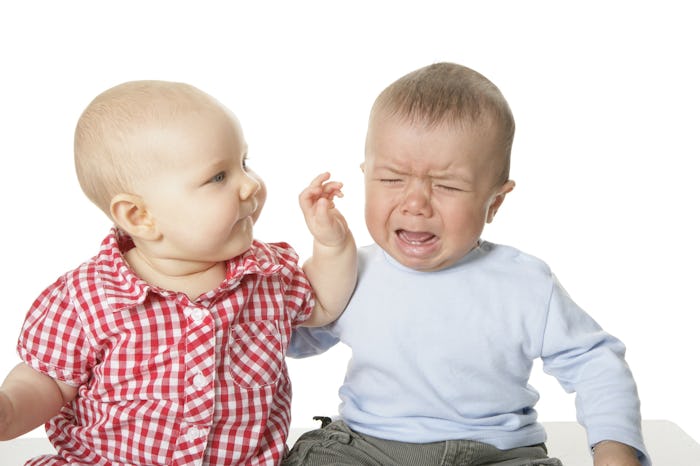When your angelic baby starts crying and fussing when other people are around, it can be kind of confusing, and a little embarrassing, too. Your baby's fear may cause people to double check their breath and apologize for upsetting your little one. But when your baby does that around people their own size, you may wonder, "why does my baby hate other babies?"
Jessica Zablan, owner of The Birth & Baby Company, tells Romper in an interview that "hate" might not be the right word. She says that it's more likely your baby is scared or overstimulated, which can happen easily for babies. "Babies become overstimulated very easily because they can't see much and there are lots of new sounds," she says.
There are other things that can overstimulate your baby, too. According to Secrets of Baby Behavior, babies under 3 months can also get upset because of seeing too many new faces, or things coming too close, and that can become a lot for them to handle. The article further explained that around 6 months of age, babies can get upset at the sight of new faces because that's when they start feeling stranger anxiety. Stranger anxiety is a survival instinct as it keeps baby close to mom right around the time they are learning to physically move away. This instinct can help prevent the baby from straying too far from their parents while they are exploring their new freedom of mobility.
So what can you do to avoid stranger anxiety or overstimulation? For younger babies who are easily overstimulated, suggested Secrets of Baby Behavior, it's a good idea to hold your baby and give them a break from the social setting if you start noticing they are getting cranky.
For older babies who are going through stranger anxiety, the website Ask Dr. Sears suggested gradually easing your baby into any social setting while acting as a positive buffer to keep them feeling safe and comfortable.
Zablan suggests that if new moms find that their gatherings with other babies are going down hill, they can try getting together in smaller groups, or sit on the floor together and feed the baby. These actions will help as your baby will be able to look around and learn their surroundings while they are safely in their parent's arms. Your baby's discomfort around other babies doesn't mean they're going to grow up to be a loner — they just aren't so sure about all of those new faces. (Especially if they're grabbing at them or stealing their toys.) A lot of patience and a calm environment can help.
